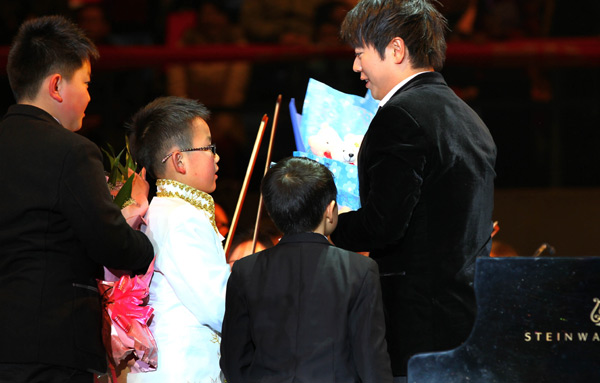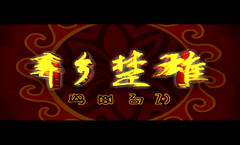Smaller concerts proved to be a big hit
By Zhang Kun in Shanghai ( China Daily )
Updated: 2013-07-01
|
 A small-scale concert conducted by Chinese pianist Lang Lang (right) in Hefei, Anhui province. Small-size concerts and plays facilitate interactive communication between performers and audiences. [Photo / Provided to China Daily]
|

Music market is diversifying as it attracts more sophisticated, dedicated audiences
All tickets to a debut China concert by former Guns N' Roses guitarist Slash sold out in three days last month. Scalpers doubled ticket prices to 3,000 yuan ($488.50).
People were still talking about the concert of Taiwan folk musician Kimbo (De-Fu) Hu at Shanghai Oriental Art Center weeks after his performance, wondering how unexpectedly successful and popular the 63-year-old alternative musician turned out to be.
"People in Shanghai are ready for some special music experiences that feel exclusive and tailor-made especially for them," Wu Liangyu, from Shining On Culture Co Ltd, a major show promoter in Shanghai, told China Daily.
Slash's sell-out gig took place at the Mixing Room and Muse, an 800-seat small hall at the Mercedes-Benz Arena complex. Shanghai Oriental Art Center's concert hall also has a small capacity of no more than 1,800 people.
These small-scale concerts - in contrast to mega shows at stadiums with more than 10,000 seats - have grown more popular with audiences in Shanghai over the past few years.
The Mixing Room held successful concerts in the past few months for Simple Plan from Canada and The Beach Boys from the United States. Upcoming on the venue's program are Coheed and Cambria, Owl City and Tony Bennett. About eight gigs from Western artists are on the agenda for this year, although the president of the Mercedes-Benz Arena, Michael Craig Enoch, declined to disclose the identities of all the artists.
"Nobody will be more than 30 meters away from the stage," Enoch said about the seating positions of the Mixing Room and Muse.
Even if you buy the lowest price ticket for a small concert, you will be closer to the performer than those who buy infield tickets for a large stadium, said Wang Yan, public relations officer for Mao Live House Shanghai.
"His sweat may splash on to the front row audiences. The atmosphere is intimate in here. You are close enough to touch him from the front row," Wang told China Daily.
Mao Live House can hold a maximum of 600 people. Kazutoshi Chiba, president of a music company called Bad News from Japan, opened Mao Live House first in Beijing and then in Shanghai in 2009.
Mao hosts three or four concerts every week. Most of the shows since 2011, when it moved to its present venue on Chongqing Road, Shanghai, are sell-outs. "First-tier artists do their shows in stadiums while alternative artists, such as indie and rock artists, tend to have successful shows with us," Wang told China Daily.

